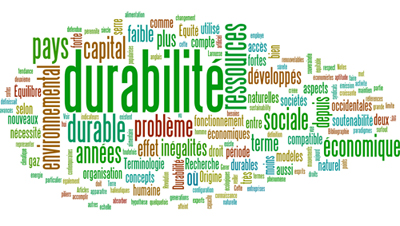What is sustainbale development ?

Sustainable development is defined as development “which meets the needs of the present without compromising the ability of future generations to meet theirs”. The Declaration of Johannesburg stipulates that economic development, social development and environmental protection are the pillars of sustainable development, they are “interdependent and … mutually reinforcing”.
Faced with the environmental and social challenges of the 21st Century, it is up to each individual to contribute to the 17 Sustainable Development Objectives (SDOs) adopted in September 2015 by the 193 United Nations member countries. These 17 objectives cover various areas such as health, access to water, the fight against poverty, equal opportunities, academic success, diversity, the fight against global warming or protection of animal or plant species.
Sustainable development at the EHESP
Through their missions and organisations, universities and grandes écoles are directly concerned by SDOs. All positions and jobs within a higher education and research establishment can, and must contribute to the SDOs through reinforced academy-wide collaboration. Therefore, the EHESP undertakes to continue to integrate sustainable development in its strategy, its internal running and its relationships with its partners.
Objectives
The EHESP would like to become an exemplary higher education establishment in terms of sustainable development, in particular by implementing the recommendations of the CGE-CPU “sustainable development” guideline. This guideline is used to evaluate the progress and relevance of action taken in terms of Sustainable Development & Social Responsibility in the establishment. It is all at once a self-diagnosis, a balanced scorecard and strategic guide.
In 2018, the EHESP was among 67 French establishments to have submitted their data to the CGE and CPU conferences for the self-assessment campaign.
EHESP’s sustainable development mission actions
Current and future actions are mobilising the School in the development of sustainable activities throughout the campus and are defined according to the 5 areas of the CGE-CPU guideline:
- Area 1: Strategy and governance
- Area 2: Teaching
- Area 3: Research
- Area 4: Environment
- Area 5: Social policy and territorial grounding
The specific objectives related to these areas are:
- Including SD & SR in running of the campus as a whole and promoting SD & SR actions
- Innovating, promoting quality training in public health to accommodate “major changes”, highlight initiatives and “student undertakings”
- Integrating the integral and ethical scientific approach, highlighting and transferring our research work to stakeholders
- In terms of environmental management, promoting a sustainable purchasing policy and sustainable printing policy, improving waste sorting and integrating the SD & SR approach in works in buildings and on the campus
- Accompanying the occupational health policy, becoming involved in regions and with the local government
Examples of SD & SR programmes in place at the EHESP
Sustainable mobility for the EHESP
In October 2016, the EHESP received the sustainable transport label awarded by Rennes Métropole. Through this label, the personnel and the students remunerated by the EHESP (initial cycle) can benefit from special offers on subscriptions to the STAR network (10%) and on the Vélo STAR subscription (15%).
Smoke-free campus
The EHESP (site in Rennes) became a smoke-free campus on 31 May 2018, on World No Tobacco Day.
Accessible campus
The EHESP has for a long time been committed to a policy in favour of accessibility for all, in order to promote the reception, participation and autonomy at the school for disabled people.
Fight against bullying
Like establishments that are members of the Rennes University project (UNIR), the EHESP works to fight bullying throughout the year and to support victims by implementing action and guides for students and staff.
Scientific integrity and ethics
In 2018, the EHESP began an “ethics, integrity and deontology” programme related to its research and training activities, and appointed a scientific integrity officer (Référent à l’intégrité scientifique – RIS).
Student investment in the school
The students contribute to the establishment’s SD & SR programme through tangible actions as part of associations (vegetable patch management, humanitarian project in developing countries, collections etc.)
The EHESP – Active participation in various bodies
Active member of the working groups and seminars for the sustainable development commission within the CGE: this commission aims to provide tools for and highlight school programmes, to organise the collective petition in order to include sustainable development and social responsibility practices in the organisation and missions of higher education and research.
Member of the group for the integration of social responsibility and sustainable development in higher education (Collectif pour l’intégration de la responsabilité sociétale et du développement durable dans l’enseignement supérieur – CIRSES): this group has implemented the SD & SR labelling scheme for higher education and research. It continues its work to position sustainable development stakes at the level of national strategies and within the establishments’ master plans.
Contributor to the ESResponsable.org participative website: this website can be used by universities, grandes écoles and their stakeholders to publish their practices and latest news about social responsibility and sustainable development in the ecosystem of French higher education and research. Find out more about the EHESP’s actions for disability, sustainable mobility or inclusive education…
Member of the Rennes inter-campus sustainable development group (Collectif Rennes Inter-Campus pour le Développement Durable – CRICDD): group bringing together around ten grandes écoles and universities in Rennes. It organises various inter-campus events for students (conferences-debates, film showings, ND4J evenings with the Ville de Rennes, etc). The CRICDD also created the Rennes student challenge “À vos défis” which consists of meeting challenges related to sustainable development, proposed by various companies.
Contact
Sustainable Development and Social Responsibility (SD & SR) mission
Estelle Baurès – SD & SR mission manager
estelle.baures@ehesp.fr


